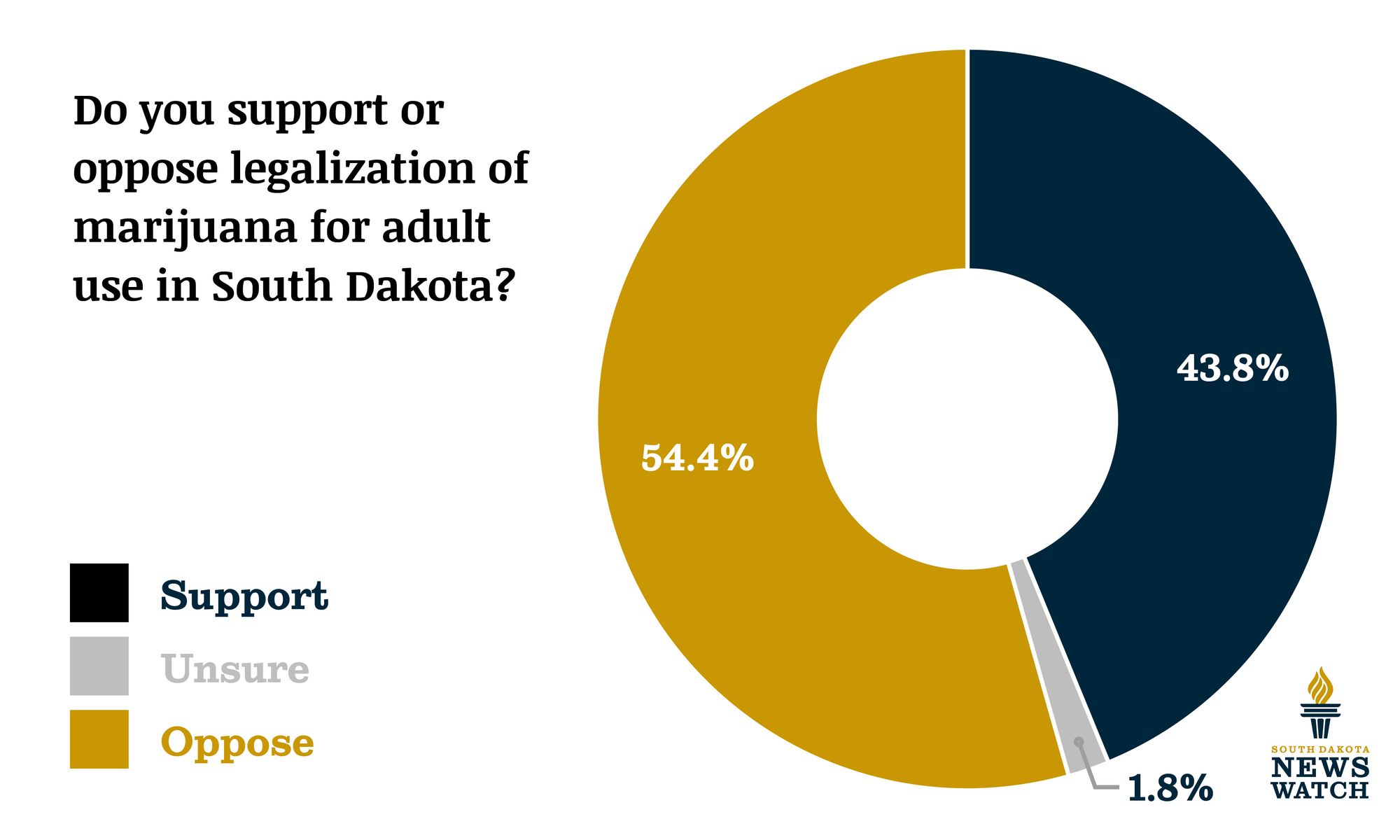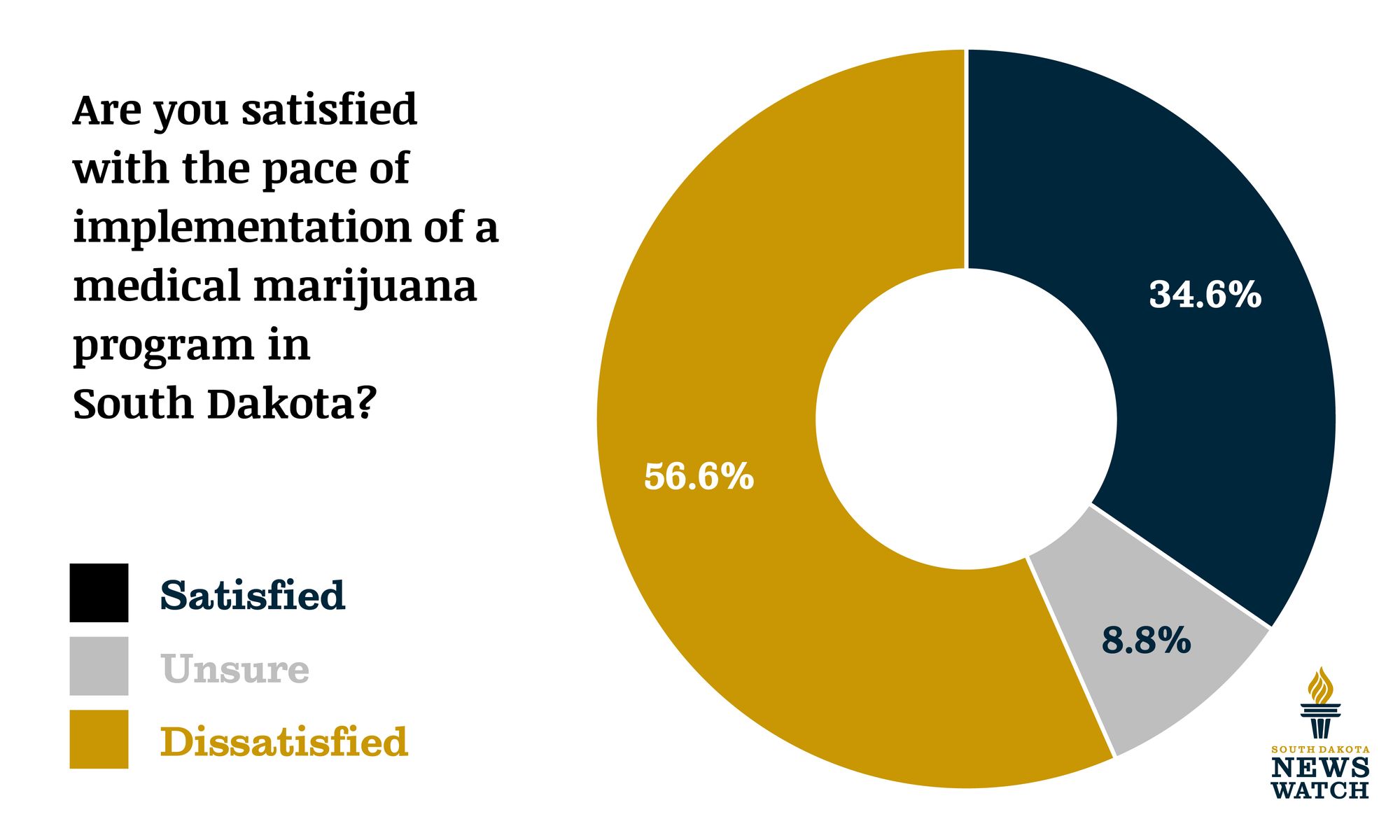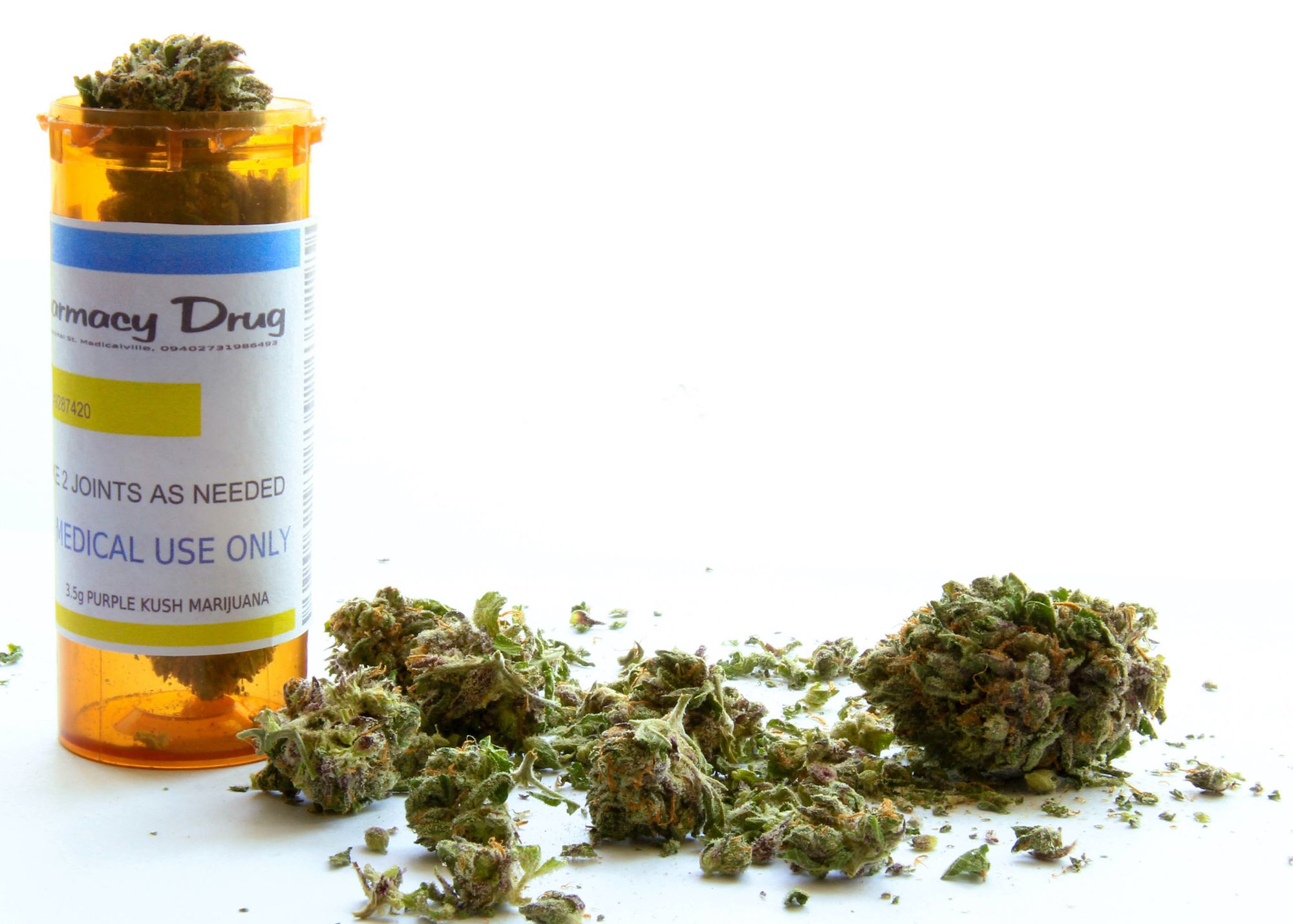Editor’s note: This is the second in a series of articles based on a July 2022 statewide poll conducted by South Dakota News Watch and the Chiesman Center for Democracy at the University of South Dakota, and is the latest segment in the ongoing “South Dakota Matters” series of polls and panel discussions hosted by News Watch.
A statewide poll conducted in late July shows that support for legalizing recreational marijuana for adult use in South Dakota has waned in the past two years and also appears to indicate that a referendum on legalization in November could fail.
The poll of 500 registered voters in July found that 43.8% of respondents support legalization of recreational marijuana, and that 54.4% oppose legalization.
South Dakota voters on Nov. 8, 2022, will go to the polls to vote on Initiated Measure 27, which would legalize recreational marijuana for adults. The ballot will also feature election of a governor, U.S. senator and U.S. representative, and other state and local officers.
Voters in 2020 passed Constitutional Amendment A, which would have legalized recreational marijuana, but the measure was overturned by the courts and never took effect.
IM 27 would pass with a simple majority of votes. The measure would legalize possession, use and distribution of marijuana by anyone at least 21 years of age in South Dakota. Adults could possess up to one ounce of marijuana and grow up to three cannabis plants; home-grow would be allowed only in locations where retail recreational marijuana is not available.
The poll was conducted by Mason-Dixon Polling & Strategy of Florida from July 19-22, 2022, and was commissioned by South Dakota News Watch and the Chiesman Center for Democracy at the University of South Dakota. Respondents were selected randomly and were representative of South Dakota voters overall in terms of age, gender, geographic location and political party. Respondents were called on cell phones and landlines; the margin of error is plus or minus 4.5%.
In the poll, 27.4% of respondents strongly supported legalization and 16.4% were somewhat supportive. Meanwhile, 39.4% strongly opposed legalization while 15.0% were somewhat in opposition, with 1.8% unsure.
Supporters of legalization were quick to question the poll results and point out that prior polls and the 2020 ballot measure to legalize adult use of recreational marijuana both indicated steady support for legalization.
“When I look a little deeper, I found things that do not make sense to me,” said Matthew Schweich, campaign director for South Dakotans for Better Marijuana Laws. “Some of the numbers don’t really make sense and conflict strongly with previous data that we’ve seen.”

In particular, Schweich pointed out that certain elements within the News Watch/USD poll do not jibe with past indicators of support for legalization in South Dakota. For example, the News Watch/USD poll showed 38.6% of poll respondents in the Sioux Falls metro area supported legalization, and 58.0% were opposed.
However, that population showed the highest level of support in the 2020 statewide vote on Constitutional Amendment A. Of the seven state Senate districts that comprise the Sioux Falls area, District 15 had the highest percentage of voters supporting Amendment A, with 72.7% in favor, and no district reporting lower than 57% support for legalization.
Furthermore, Schweich noted that the News Watch/USD poll showed the highest support for legalization was among voters ages 18-34 (54.2%), which follows prior polling and election results. However, the News Watch/USD poll showed the second highest level of support (44.4%) was among respondents age 65 and above, which contrasts with prior polling and election results that show older voters generally do not support marijuana legalization.
“I see this as a flawed poll, but one that I still need to keep in the back of my head as motivation to keep working hard,” Schweich said. “I’m not going to dismiss this poll entirely, and it’s a reminder that we have to work really hard and not take anything for granted because in recent times, it’s gotten harder and harder to predict what an electorate will look like.”
An opponent of legalization of recreational marijuana said he was heartened by the News Watch/USD poll results, but added that he and other opponents will continue to try to educate the public on the dangers of marijuana and the negative effects of legalization before the vote.
The only registered political committee to oppose IM 27 so far, formed in July 2022, is called Protecting South Dakota’s Kids.
The group’s chairman is Jim Kinyon of Rapid City, a certified mental health counselor who also serves as executive director of Catholic Social Services. State Rep. Fred Deutsch, R-Florence, is the group’s treasurer, according to state records. The group has not yet filed a campaign finance report.
“South Dakota is coming to our senses; we’re starting to see that this isn’t going to make us free and happy,” Kinyon said.

Kinyon called the supporters of recreational marijuana “drug pushers” from out of state who are seeking to make big profits by making a harmful drug more widely available.
Kinyon added that if legalization of recreational marijuana does cause youth use of marijuana to rise, the state could see academic achievement fall and the risk of youth suicide rise.
“This stuff attacks the organ of the brain, and our kids and our young adults won’t be better citizens,” he said. “Our kids are struggling in our state, and we already don’t have adequate resources to help them. We have to defend our kids because they deserve better.”

Medical marijuana already legal
South Dakota is in the early stages of implementing its medical marijuana program, which was approved by 70% of voters who supported Initiated Measure 26 in November 2020. Marijuana for medical use became available in the state this summer, and several more dispensaries are in the process of obtaining marijuana products for sale in the near future.
South Dakota voters in the 2020 election also approved Constitutional Amendment A, which would have legalized recreational marijuana for adult use, with a margin of 54% in favor to 46% opposed, a difference of about 35,000 votes.
However, a subsequent legal challenge — supported by Gov. Kristi Noem — led first a circuit judge and then the state Supreme Court in November 2021 to overturn the ballot measure, with justices finding Amendment A too broad.
IM 27 was approved for the November 2022 election in May 2022 after supporters submitted about 25,000 valid signatures in support of the ballot measure. Supporters of IM 27 say it is more limited in scope than Amendment A, dropping references to medical marijuana and hemp, and avoiding language about taxation, licensing and local regulation of marijuana, potentially making it more resistant to court challenges should it pass. IM 27 also would not affect the state Constitution.
As of mid-2022, 19 U.S. states and the District of Columbia have legalized recreational marijuana for adult use. Colorado and Washington were the first states to legalize recreational marijuana in 2012; Montana is the only state bordering South Dakota where recreational marijuana is legal. Another 13 states have decriminalized possession of marijuana.

Close vote likely in November
Schweich noted that in midterm elections, including the one scheduled for November 2022, the party of the incumbent president typically suffers, in this case the Democratic Party of President Joe Biden. In the News Watch/USD poll, 72.5% of Democrats support legalization of recreational marijuana, compared with only 23.8% of Republicans in support.
As legalization spreads further across the U.S., Schweich said one of the main reasons to support legalization of recreational marijuana is to provide for regulation and safety in the sale and purchase of marijuana.
“Part of the reason to legalize cannabis is to take it out of the black market, because black-market dealers don’t check IDs and they often have other drugs for sale,” Schweich said. “Everybody out there who buys alcohol, they go to the store and they buy alcohol and they’re not exposed to other drugs.”
Ned Horsted, executive director of the Cannabis Industry Association of South Dakota, said legalization would take money away from drug dealers and shift it instead to legitimate businesses and also to the state in the form of taxes and development of a new industry.
“When legalization does come, it will generate a lot of jobs and a lot of new tax revenue for the state,” he said.
Horsted said current marijuana laws in South Dakota are some of the strictest in the nation, and are leading to the necessary and costly imprisonment of people convicted of simple possession.
“I think South Dakotans are compassionate and fair people,” he said. “All this does is basically says we’re not going to arrest adults for possessing a small amount of marijuana. So, do we tax and regulate this, or do we allow this to be the Wild West as it has been in the past?”
Other recent polls by Mason-Dixon have proven to be accurate or at least consistent, including recent News Watch polls on abortion and others previously done in South Dakota on marijuana.
A Mason-Dixon poll commissioned by the Sioux Falls Argus Leader newspaper and KELO-TV in October 2020 was prescient in capturing public sentiment about marijuana ballot measures that year. The poll of 625 registered voters proved to be remarkably accurate, showing that 74% of respondents supported IM 26 (to allow medical marijuana) and that 51% supported Amendment A (to allow recreational marijuana sales). The vote tally two months after the poll showed 70% of voters in favor of IM 26 and 54% in favor of Amendment A.
Schweich said that during signature collection, he was intrigued to note how many people said they would vote in favor of legalization in part because of the way Gov. Noem and two law enforcement officers intervened and had the vote overturned through legal challenge.
Horsted said the next few months could be critical in terms of people making up their minds on how to vote on recreational marijuana.
“If you look at the people who were undecided and those who were somewhat supportive or opposed to legalization, you’re looking at almost a third of the people who haven’t made up their minds yet,” he said. “There’s plenty of time for South Dakotans to talk about this and determine if indeed it is time to stop wasting taxpayer money on prosecuting small-level marijuana crimes.”
Rep. Mike Derby, R-Rapid City, is one of the leaders of the informal cannabis coalition in the state Legislature, and is knowledgeable about matters surrounding marijuana legislation.
Derby said he was somewhat surprised by the News Watch/USD poll results showing a majority in opposition to legalization of recreational marijuana. “I thought those numbers would have been reversed,” he said.

Derby theorized that since Amendment A in 2020 also had references in the ballot language to medical marijuana and hemp, perhaps some voters in 2020 supported the amendment because they believed it legalized medical marijuana.
“There’s always been the question of whether people were confused in 2020, that some people may have voted thinking it had to do with medical,” he said. “So, it begs the question, now that it is a single subject, will that lower the level of support?”
The News Watch/USD poll also indicated that respondents are unhappy with the pace of implementation of the state medical marijuana program. Results showed that while 34.6% of respondents were satisfied with the pace, 56.6% were dissatisfied, while 8.8% were unsure.
Latest legalization effort mostly local
Opponents of the effort to legalize recreational marijuana in South Dakota have been critical of what they say is an out-of-state lobbying and funding effort that is supporting legalization.
However, state campaign finance records show the most recent effort to promote Initiated Measure 27 to legalize recreational marijuana is funded largely by in-state sources and with local labor.
South Dakotans for Better Marijuana Laws is the primary political action committee in favor of IM 27; the group also played a large role in support of Amendment A in 2020.
In 2020, two groups supporting legalization of marijuana raised about $2.4 million and spent about $1.6 million, according to state records. Much of that funding came from out-of-state interests.
However, South Dakotans for Better Marijuana Laws has raised far less money to support IM 27 and most of its donations in this campaign have come from within South Dakota.
The group did receive about $68,000 in donated services in 2022 from the New Approach Advocacy Fund in Washington, D.C., to fund the signature-collection drive, and roughly $40,000 in donated consulting services from the Marijuana Policy Project in Washington, D.C.
But so far in 2022, the group has reported only $47,300 in income — almost entirely from in-state sources — and reported expenses of about $26,000, roughly $22,000 of that in advertising, according to state records.
Matthew Schweich, campaign director for South Dakotans for Better Marijuana Laws, said his group has four employees, including three who were born and raised in South Dakota. Schweich said he is not originally from South Dakota but now lives in Sioux Falls.






